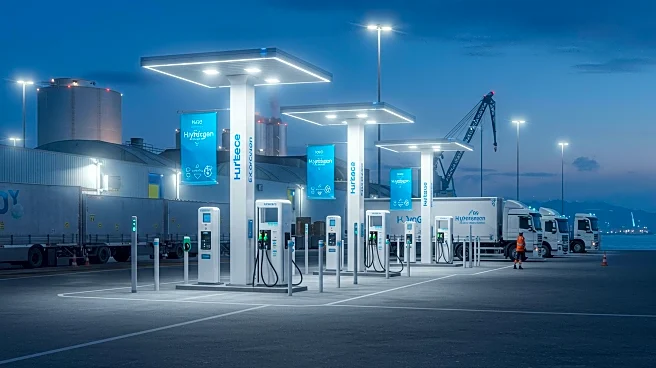What's Happening?
Toyota Motor North America is advancing its environmental initiatives by deploying hydrogen-powered trucks and fuel-cell systems at the Port of Long Beach, California. The company has partnered with FuelCell Energy to establish a new vehicle processing center powered by fuel cells. This center, which is Toyota's largest vehicle processor in North America, handles over 200,000 Toyota and Lexus vehicles annually. The hydrogen trucks, equipped with Toyota's Gen 3 FC fuel-cell systems, are designed to cover routes to parts centers in Ontario, California, and San Diego. These trucks can travel up to 600,000 miles without major servicing, and hydrogen refueling stations are available at Long Beach and the North American Parts Center in Ontario. Toyota's efforts are part of a broader strategy to decarbonize its commercial fleet and reduce emissions at major ports.
Why It's Important?
The implementation of hydrogen-powered trucks and fuel-cell systems by Toyota represents a significant step towards reducing carbon emissions in the transportation sector. This initiative aligns with global efforts to transition to cleaner energy sources and reduce reliance on fossil fuels. By utilizing hydrogen, which can be refilled faster than diesel, Toyota aims to alleviate air pollution and emissions at the Port of Long Beach, a critical hub for vehicle processing. The move also highlights the potential of hydrogen as a viable energy source for heavy-duty transportation, which could lead to broader adoption across the industry. Stakeholders in the automotive and energy sectors may benefit from increased investment in hydrogen infrastructure, potentially driving innovation and sustainability in logistics and transportation.
What's Next?
Toyota plans to continue developing and validating its hydrogen-powered Class 8 trucks, with operations expected to commence soon. The company is working with Air Liquide to build a new hydrogen station in Ontario, California, which will store cryogenically cold liquid hydrogen. This facility aims to provide consistent and reliable hydrogen supply, addressing previous supply challenges. As Toyota progresses with its hydrogen initiatives, other industry players may follow suit, potentially leading to increased collaboration and investment in hydrogen technology. The success of these efforts could influence policy decisions and encourage further development of hydrogen infrastructure, particularly in regions with high transportation emissions.
Beyond the Headlines
Toyota's initiative at the Port of Long Beach not only addresses environmental concerns but also showcases the potential for hydrogen to transform the logistics and transportation sectors. The use of fuel cells and hydrogen technology could lead to long-term shifts in energy consumption patterns, promoting sustainability and reducing dependence on traditional fossil fuels. Additionally, the collaboration between Toyota and FuelCell Energy highlights the importance of partnerships in advancing clean energy solutions. As hydrogen technology evolves, ethical considerations regarding energy sourcing and environmental impact will become increasingly relevant, potentially influencing corporate strategies and public policy.









